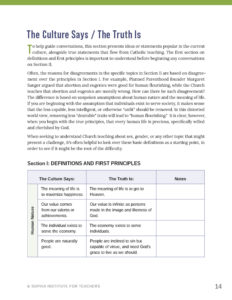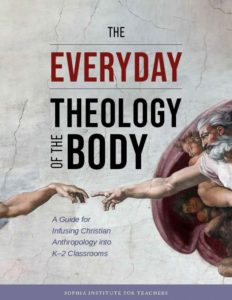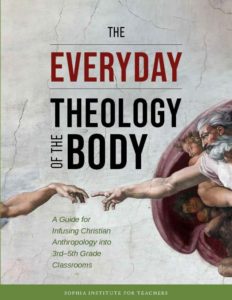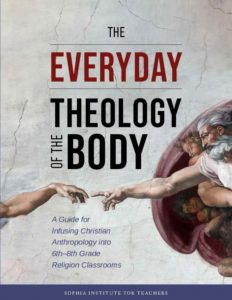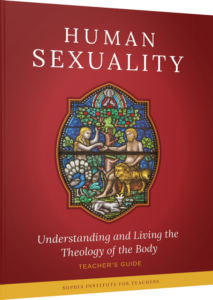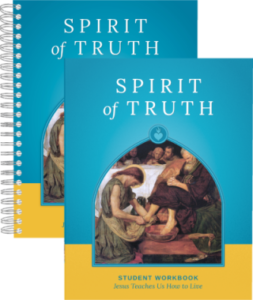Responding to TRANSGENDER IDEOLOGY
Concrete Help for Teachers and Parents
Talking points for speaking to kids on gender and pronouns, and other tough topics
- You are a boy/girl. You are wonderful in the way you [list special talents and gifts].
- As a baptized Christian, you are a child of the Most High! God is your loving Father. He wants what’s best for you and so do we as your parents.
- A boy can like to do things girls usually like, and it doesn’t mean he is a girl. A girl can like to do things that boys usually like, and it doesn’t mean she is a boy.
- There are many things about ourselves that we choose. You choose to be kind to your little brother, or you choose to be a soccer player, or a violinist, [use examples specific to your child] and we choose the job we want when we grow up.
- There are other things about ourselves that God chooses. Some examples are our birthday, whether we have siblings, and whether we are a girl or a boy.
- Being a girl / being a boy is something very special. It is part of who you are.
- Even before God made you, He knew who you would be, and He had a plan for you. He loves you, and so do we. We can trust that God chose your gender correctly.
- Our very bodies tell us something about how God created men and women to complement each other. We were made male and female, and God’s instructions were to “be fertile and multiply” (Gen 1:28).
- Each person is male or female from the moment of their conception.
- We talked about how there are things we choose about ourselves and things God chooses. [See #2 above]
- It is true that a tiny minority of people are born with physical abnormalities, but we are all either male or female in our DNA.
- This includes those who, for some unknown reason, identify themselves a person of the opposite sex. This belief can result in severe psychological confusion and pain for the person, as well as for the person’s family and friends.
- God has a plan for each one of us, and through prayer and discernment we can discover it, and do our best to live it out. We are all in need of God’s grace.
Sex refers to our biological make-up as male or female. Gender refers to the expression of that sexual identity. The words “male” and “female” refer to sex, while “masculine” and “feminine” refer to gender. Over time, specific traits associated with girls and women came to be known as “feminine” and those with boys and men as “masculine.” Females can have masculine traits, but that does not make them “trans men,” and males can have stereotypically feminine traits.
A person’s gender is determined by their sex.
Technically yes, they are! But not as different as the culture says. But women are, by definition, feminine, and men are by definition masculine. This does not mean that all females will embody all feminine behaviors or preferences, and males the masculine ones. Even the most feminine of men is still a man, and nothing can change that.
Gender is not simply a societal norm or performance as some claim it is. Masculinity (manliness) and femininity (womanliness) are essential parts of our identities. We are, at our core, male or female, and this essential truth is reflected not only in our bodies, but in the way we think, the way we respond to the world around us, and so many different aspects of being human. Maleness and femaleness are not socialized concepts but are truths we inherently know. A woman does not have to wear exaggerated clothing and heavy make-up like drag queens do to be recognized as women. We automatically recognize and understand the truth of maleness and femaleness because it is so essential to our human nature. Further, God’s plan for married men and women takes our gender into account: marriage is a sign of the union between Christ and His Church, and marriages especially flourish when husbands are manly and wives are womanly. As Pope St. John Paul II wrote, each person is called to love “He is called as a person in the truth of his humanity, therefore also in the truth of his masculinity or femininity, in the truth of his body.”
- Your friend is a boy/girl who is wonderful in so many ways [mention some of the good qualities of the friend that your child admires].
- We do not understand fully why sometimes a boy thinks he is a girl/a girl thinks she is a boy.
- Emphasize our duty to treat every person with respect and dignity.
- A charitable response emphasizes our love and concern for our friend, including for his/her soul.
- We do know that we are all wounded and experience the effects of Original Sin. We all need the grace of God.
- You may need to decide whether this is a friendship that should continue, depending on the circumstances. Keep in mind the friend’s parents’ approach to gender dysphoria, as well as your child’s age and maturity, when discerning whether the friendship is in the best interest of your child’s innocence and spiritual growth.
- Acknowledge the person’s sadness with charity and compassion, and emphasize our duty to treat every person with dignity.
- The sad reality is that those who have this kind of surgery do not in fact have better outcomes overall. The surgery is irreversible, while doing nothing to heal the psychological problems that are causing the gender dysphoria.
- Most who experienced gender dysphoria as children identify as their biological sex by the time they reach adulthood.
- Oftentimes in life, unhappiness comes from the wrong expectations about what will make us happy. If we convince ourselves that we cannot be happy without one particular thing, it can become a self-fulfilling prophecy. Worse, if/when we do attain the one thing we think we cannot be happy without, we are inevitably disappointed, leading to even greater sadness.
- It’s important to keep the perspective that nothing in this world will truly and completely fulfill us. True happiness is only possible in Jesus Christ.
- For more information see https://www.thenewatlantis.com/publications/number-50-fall-2016, and https://lc.org/PDFs/Attachments2PRsLAs/2018/061118SexReasssignmentSurgery.pdf
- No. A person being male or female cannot change, even if someone has surgery, takes hormone therapy, or has other interventions.
- We should treat those experiencing gender dysphoria with compassion. We should lovingly encourage and help them to accept their body including their identity as male or female.
- Just as we would not withhold food from someone with a body image disorder, we should not encourage someone to mutilate or poison their body to align with a mistaken belief about gender.
- Many who have been encouraged to undergo irreversible surgical procedures experience deep regret.
- No. Girls need private spaces of their own.
- Boys experiencing gender dysphoria deserve to be treated with compassion, and so do girls. They deserve places of privacy where they can be free of the gaze of boys/men while they are showering/changing clothes.
- God calls us to tell the truth, but we must always tell it with charity.
- We must find charitable ways to express ourselves that do not require us to break the Eighth Commandment.
- You can reference your biological sex and the pronoun that goes with it, e.g. “I am a female, so the pronoun is ‘she.’”
- No. The reason we have separate sports for girls and boys is because of the inherent differences between males and females, and the physical advantages most boys have over most girls.
- It is true that some of the strongest women are stronger than the weakest men. But on average, men are bigger, stronger, and faster than women, making meaningful competition between them unrealistic in most sports.
- Girls deserve teams of their own to fairly compete.
- It is not bigoted. Manhood and womanhood are realities. They are not feelings, no matter how sincerely those feelings are experienced.
- Those who struggle with a confused sense of sexual identity must be lovingly accepted as persons created in God’s image with the same dignity as any other person.
- Further, as Christians, we must pray for peace in their unique struggles and support them with Christian charity, all the while upholding the truth of God’s plan for life and love.

